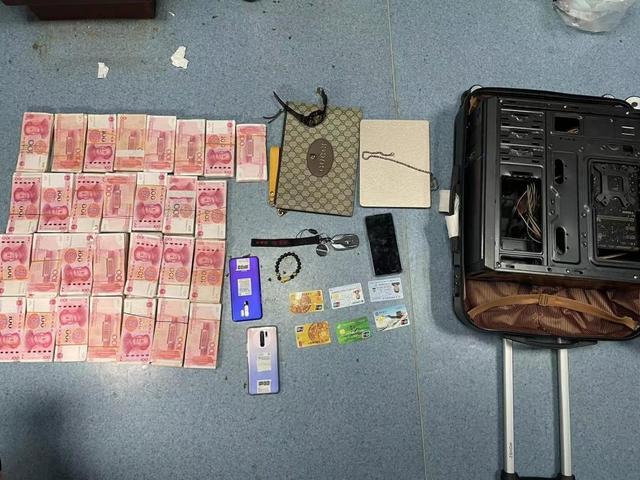Eric's Insight: China, Myanmar need to join hands against online fraud
Nowadays, Chinese netizens are greeted by hefty job opportunities in the towns of Muse, Myawaddy or Tachileik, northeast Myanmar. Is the information true? Not always.

Money and instruments confiscated from online fraudsters by Wuhan police on February 16-17 (Online photo subject to deletion)
On February 28, the Chinese Embassy in Myanmar issued a notice, telling Chinese folks to be wary of job information related to the said towns. Earlier, police in central China’s Wuhan city cracked down a 13-member fraud gang that had returned from north Myanmar.
“Via online lending apps of Xindaibao and Renrendai, the transnational gang has stolen more than 30 million yuan from the Chinese victims over one and a half years,” said Lu Jian, a Wuhan police officer.
Among few women in this fraud gang is 24-year-old Ms. Chu, who initially planned to open a nail-beautifying shop with her boyfriend in Kunming, Yunnan province, but she soon gave up and left for Myanmar at an e-pal’s suggestion that lucrative business lies in the neighbor country.
The embassy notice also warned that some Chinese “gold diggers” were forced to engage in illegal activities such as online fraud and gambling, while others were even beaten, detained or extorted.
Why did the Chinese outlaws choose north Myanmar as destination for their illegal dealings and impossible activities? The immediate reason may be social disorder.
Areas near the China-Myanmar border have long been marred by armed ethnic organizations, and the ongoing political unrest in the country has made things worse, leaving some areas in a sort of anarchistic state.
But the root cause lies in the cross-border ethnic groups. Without local support, the Wuhan criminals could not possibly operate their networks in Myanmar.
Familiar with the Chinese culture and language, rogues in the ethnic minorities are able to effectively plot with the Chinese outlaws in their online cheating and money laundering. Li Saigao is a case in point.

Myanmar online celebrity Li Saigao (Online photo subject to deletion)
"The real identity of Myanmar’s online celebrity Li Saigao is member of a fraud gang in northern Myanmar," said a February 23 statement by police in Yunnan’s neighboring province of Guizhou.
A handsome young man on Douyin, popular video-sharing social network among the Chinese-speaking communities in China, as well as in Southeast Asia, Li is good at singing Chinese pop songs and thus followed by 1.2 million and liked by even more.
Belonging to the Wa ethnic group in Shan State, Li wears a green army uniform and claims himself to be a descendant of the Chinese Expeditionary Force, winning approval and trust from the general public in China and beyond.
Cross-border ethnic groups abound in the border areas, and they’re supposed to be cultural bridges that facilitate the China-Myanmar friendship. Unfortunately, some of them turned out to be online fraudsters under the guise of so-called patriotism, harming Myanmar and China alike.
To bring the criminals to justice and maintain social order in the China-Myanmar border areas, police in the two countries need to cooperate even closer under the Lancang-Mekong Cooperation mechanisms.
The China-Laos-Myanmar-Thailand joint patrol on Mekong could be extended to certain riverside nests of transnational criminals, and the Lancang-Mekong Integrated Law Enforcement and Security Cooperation Center may play a bigger role in this regard.
(The writer Eric Wang Shixue is an English editor with the Mekong Magazine based in Kunming, Yunnan province. The view in the article does not necessarily represent that of Yunnan Gateway.)